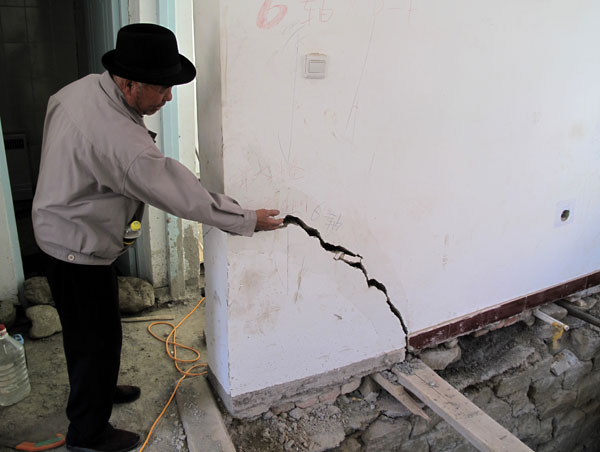Faulty houses found in Urumqi's settlement
Updated: 2013-05-31 07:43
By Cui Jia and Mao Weihua in Urumqi (China Daily)
|
|||||||||||
Su Jinshi has refused to move into a settlement built as part of a relocation program in the Xinjiang Uygur autonomous region, after the floors of some new houses cracked and began to sink.
"The settlement used to be a gravel factory and the foundations of the houses are built on sandstone instead of solid ground," the 60-year-old from Wulapo village, said on Wednesday as he kicked at a cracked wall of a house.
He said the houses, built two years ago, are supposed to be earthquake-proof, but the walls crack with just one kick - and they are sinking.
"We fear that all 600 houses in the settlement have the same problem and are not safe to live in," Su said. "Luckily, no one has moved in yet."
 |
|
Su Jinshi, a 60-year-old villager in Wulapo, Urumqi, examines a crack in his house on Wednesday. Mao Weihua / China Daily |
The homes are all two-story buildings with red roofs. The settlement, about 18 km from Urumqi, the regional capital, also has two golden-topped mosques.
The subsidence was spotted in April by villagers who planned to move to the settlement this year. Their old homes are next to Wulapo reservoir, Urumqi's main drinking water source.
In 2009, the government decided to protect the reservoir by relocating nearby villagers to a settlement, as farming and herding activities posed a threat to the water quality.
So far, more than 200 households have moved to the settlement. Bahet Yibula, a member of the Kazak ethnic group, and four of his family members who relocated in October were also worried.
"There are many fine lines along the wall," the 50-year-old said. "I hope they are not the sign of something more serious. I don't want to wake up to find my family buried. I wonder how the government approved the project."
Cao Bin, deputy chief of Tianshan district, where the relocation is taking place, said that authorities are trying to identify the responsible parties.
"If any corruption or malfeasance is involved, as the villagers suspect, the officials responsible will be punished," he said.
The district's construction bureau has taken all parties involved in the construction of the problem houses - including surveyors, constructors and inspectors - to court. The case will be tried in June, Cao said.
Ma Xiang, of Tianshan's construction bureau, said five houses were found to have been built on sandstone and repair work began as soon as the villagers reported the issue.
The district also hired professionals to inspect the foundations of other houses around the ones with quality problems, none of which share the same problems, he said.
"To make the residents feel safe, all 600 houses will be inspected within a month and we will deliver the reports to villagers," Ma said. "We won't let anyone live in unsafe houses."
Another reason villagers are reluctant to move is that they have to live far away from their farmland.
"I will have to travel 10 km every day to work in my field," Bahet said. "For the government, the relocation is a project, but for us it's not only about the houses but a different life for us and our children," he added.
Cao conceded that the farmland issue is a problem, and so far there is no good solution.
"The reservoir protection program covers a wide area so there is no farmland available near the settlement. There is not much we can do at the moment."
Related Stories
One missing after N China flood, 4,000 relocated 2013-05-09 14:56
Guangdong to ban relocation by threats 2013-04-25 14:45
11,000 relocated after SW China quake 2013-04-19 12:18
Grave problem for burials in rural China 2013-04-03 11:13
Today's Top News
China corrects Japan on treaty's Diaoyu implications
Manila condemned over grounded warship
Russian envoy vows to boost ties
EU to step up investment in China
Higher education goes global
Plastic ban fails with ultra-thin bags
Flow test for water project gets underway
Campaign to help moms find breastfeeding rooms
Hot Topics
Lunar probe , China growth forecasts, Emission rules get tougher, China seen through 'colored lens', International board,
Editor's Picks

|

|

|

|

|

|





